I'm struggling with a simple scenario: I would like to retrieve my account from Active Directory using the username and password which I use to log into my computer.
My first issue was that I was receiving a referral from the server when attempting to call UserPrincipal.FindByIdentity. I thought that this was a bit weird, given the fact that PrincipalContext.ValidateCredentials was working fine, but it turns out that my DC path was incorrect.
I wasn't sure how to properly craft my OU/DC string. As such, I found this SO post which helpful provided the following bit of code:
private static string GetDomainControllerString()
{
string pdc;
using (var context = new PrincipalContext(ContextType.Domain))
{
string server = context.ConnectedServer; // "pdc.examle.com"
string[] splitted = server.Split('.'); // { "pdc", "example", "com" }
IEnumerable<string> formatted = splitted.Select(s => String.Format("DC={0}", s));// { "DC=pdc", "DC=example", "DC=com" }
string joined = String.Join(",", formatted); // "DC=pdc,DC=example,DC=com"
// or just in one string
pdc = String.Join(",", context.ConnectedServer.Split('.').Select(s => String.Format("DC={0}", s)));
}
return pdc;
}
After using this code to properly generate my DC string, my error message changed. Now, I am receiving the error "There is no such object on the server." I suspect the issue is either with my OU or how I am calling FindByIdentity.
Here is the location of my user account which I am trying to retrieve:

And here is how I am attempting to access said user:
private static void Main(string[] args)
{
const string Domain = "SLO1.Foo.Bar.biz";
const string DefaultOU = "OU=Users,DC=SLO1,DC=Foo,DC=Bar,DC=biz";
const string username = @"sanderso";
const string password = "**********";
var principalContext = new PrincipalContext(ContextType.Domain, Domain, DefaultOU, ContextOptions.Negotiate, username, password);
bool areCredentialsValid = principalContext.ValidateCredentials(username, password, ContextOptions.Negotiate);
if (areCredentialsValid)
{
UserPrincipal userPrincipal = UserPrincipal.FindByIdentity(principalContext, username);
}
}
I have also tried calling:
UserPrincipal.FindByIdentity(principalContext, IdentityType.Name, "Sean Anderson");
UserPrincipal.FindByIdentity(principalContext, "Sean Anderson");
these were equally unsuccessful.